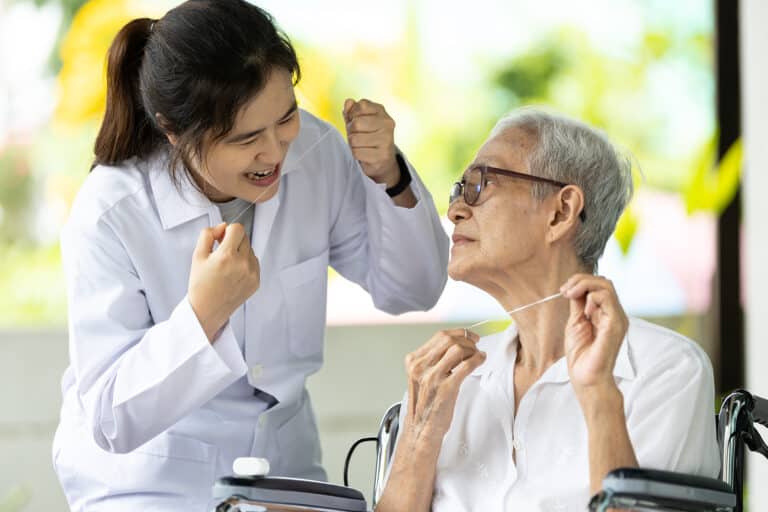Oral cancer is a major health problem that affects many seniors, frequently unnoticed until the disease has progressed. While aging raises the risk of developing oral cancer, lifestyle choices can significantly increase or reduce that risk. These choices can make a significant difference in seniors’ general health, including oral health. Seniors with companion care at home services gain the support they need to understand their risks and take action to reduce them.
Smoking and Tobacco Use
Tobacco smoking is one of the most important lifestyle variables that influences the chance of developing oral cancer. Smoking and chewing tobacco are highly connected to many types of oral cancer, especially among seniors who have been using these products for decades. Tobacco’s toxins irritate the tissues of the mouth, making them more susceptible to cancer.
Smoking also impairs the body’s capacity to fight infections, making it difficult for mouth wounds to heal and raising the risk of cancer formation. Even after quitting smoking, seniors’ risk of developing oral cancer remains high for many years.
Essentially, the longer an individual has smoked or chewed tobacco, the greater their risk.
Alcohol Consumption
Alcohol consumption is another important lifestyle factor that influences the risk of developing oral cancer. According to studies, seniors who consume alcohol on a regular basis are more likely to acquire oral cancer than those who do not drink. The risk is significantly higher for individuals who drink and smoke, as the two might work together to damage the tissues in the mouth and throat.
Seniors who drink regularly or binge drink, especially those who consume alcohol on a daily basis, should be aware of the serious long-term consequences for their oral health.
Diet & Nutrition
A well-balanced diet high in fruits and vegetables protects against various cancers, including oral cancer. Antioxidants, vitamins, and minerals included in whole foods such as leafy greens, berries, citrus fruits, and cruciferous vegetables help neutralize free radicals, which can cause malignant cell damage. A fiber-rich diet limited in processed foods, sweets, and red meat lowers general cancer risk, including mouth cancer.
Companion care at home providers can help seniors create meal plans that are well-balanced, as well as shop, prep, and cook for them.
Seniors with deficient levels of the vitamins A, C, and E, may be at a higher risk of developing oral cancer. These vitamins are essential for maintaining the health of the oral tissues and protecting them against cancer-causing chemicals.
If seniors aren’t able to get these vitamins from the foods they eat, they should speak with their medical team about other options.
Oral Hygiene & Care
Good dental hygiene is another lifestyle decision that can reduce the incidence of oral cancer in seniors. Proper brushing, flossing, and frequent dental examinations can help detect early signs of oral cancer before it progresses. Neglecting dental hygiene can cause persistent inflammation and infections, increasing the chance of getting oral cancer over time.
While aging cannot be avoided, choosing informed and mindful lifestyle choices can significantly reduce seniors’ risk of developing oral cancer. With support from companion care at home, seniors may be able to reduce their risk of acquiring oral cancer by incorporating the strategies above, as well as scheduling and attending regular dental appointments.
If you or an aging loved one is considering Companion Care at Home in Carlsbad, CA, please contact the caring staff at A Passion for Care today. Call (858) 798-5005
A Passion for Care is a Trusted Home Care Agency serving San Diego, La Jolla, Del Mar, Rancho Bernardo, Encinitas, Oceanside, Rancho Santa Fe, Point Loma, and surrounding areas.
Sources:
- https://www.cancer.org/cancer/risk-prevention/diet-physical-activity/alcohol-use-and-cancer.html#:~:text=Alcohol%20use%20clearly%20raises%20the,mouth%2C%20throat%2C%20and%20esophagus.
- https://www.cancer.org/cancer/types/oral-cavity-and-oropharyngeal-cancer/causes-risks-prevention/risk-factors.html#:~:text=factors%20listed%20below.-,Tobacco%20and%20alcohol%20use,in%20people%20who%20don’t.
- https://dentistnj.com/how-lifestyle-choices-affect-oral-cancer-risk-making-healthy-decisions/
- https://legacydentalteam.com/diet-and-lifestyle-on-oral-cancer-risk/
Making the transition to a completely new industry brought the opportunity to learn and grow, which continues still today. Pat studied Gerontology in San Diego State University’s certificate program and became licensed as a Certified Nurse Assistant (CNA), a Home Health Aide (HHA), and completed the California Certification Program for Residential Care Facilities for the Elderly (RCCFE) as a Certified Administrator. She presented workshops at Aging in America Conference four years in a row and served as Chair of the San Diego Regional Home Care Council 2019-2020 and was the education board member for several years. More recently, Pat became a Certified Senior Advisor and was a San Diego Business Journal “50 over 50 2022 Women of Influence Honoree”.
Pat and her husband Roland have lived outside San Diego in the San Pasqual Valley for over three decades. She has two children who are grown professionals and three grandchildren. Pat enjoys traveling to, and visits from, family and friends throughout the year. While at home in San Pasqual Valley, she and Roland enjoy peaceful views and exploring the surrounding valleys.
- Understanding Chronic Disease Care: Supporting Seniors at Home - April 24, 2025
- Supporting Senior Nutrition with Home Care - April 7, 2025
- Caring for Caregivers: Preventing Caregiver Burnout - March 27, 2025








